racial squeamishness would not allow Hollywood to cast him as a romantic lead, despite his good looks
. ......... Mr. Poitier often found himself in limiting, saintly roles that nevertheless represented an important advance on the demeaning parts offered by Hollywood in the past. ........ The best-actor award came in 1964 for his performance in the low-budget “Lilies of the Field,” as an itinerant handyman helping a group of German nuns build a church in the Southwestern desert. ........... In 1967 Mr. Poitier appeared in three of Hollywood’s top-grossing films, elevating him to the peak of his popularity. .......... Mr. Poitier grew up in the Bahamas, but he was born on Feb. 20, 1927, in Miami, where his parents traveled regularly to sell their tomato crop. The youngest of nine children, he wore clothes made from flour sacks and never saw a car, looked in a mirror or tasted ice cream until his father, Reginald, moved the family from Cat Island to Nassau in 1937 after Florida banned the import of Bahamian tomatoes. .......... Mr. Poitier had known nothing of segregation growing up on Cat Island, sothe rules governing American Black people in the South came as a shock. “It was all over the place like barbed wire,” he later said of American racism. “And I kept running into it and lacerating myself.”
.......... In less than a year he fled Miami for New York, arriving with $3 and change in his pocket. He took jobs washing dishes and working as a ditch digger, waterfront laborer and delivery man in the garment district. Life was grim. During a race riot in Harlem, he was shot in the leg.He saved his nickels so that on cold nights he could sleep in pay toilets.
............ Feigning a mental disorder, he obtained a discharge in 1945 and returned to New York, where he read in The Amsterdam News that the American Negro Theater was looking for actors. .............. Undeterred, Mr. Poitier bought a radio and practiced speaking English as he heard it from a variety of staff announcers. A kindly fellow worker at the restaurant where he washed dishes helped him with his reading. Mr. Poitier finally won a place in the theater’s acting school, but only after he volunteered to work as a janitor without pay. ................. his purpose to expand the boundaries of racial tolerance. “The explanation for my career was that I was instrumental for those few filmmakers who had a social conscience,” he later wrote. ............ The critics who would later accuse him of bowing and scraping before the white establishment seemed to dismiss Mr. Poitier’s longstanding, outspoken advocacy for racial justice and the civil rights movement, most visibly as part of a Hollywood contingent that took part in the 1963 March on Washington. Early in his career, his association with left-wing causes and his friendship with the radical singer and actor Paul Robeson made him a politically risky proposition for film and television producers. ........... His style, however, remained low-key and nonconfrontational. “As for my part in all this,” he wrote, “all I can say is that there’s a place for people who are angry and defiant, and sometimes they serve a purpose, but that’s never been my role.” ........ In 1997 he delivered a widely praised performance as Nelson Mandela in “Mandela and de Klerk,” a television movie focusing on the final years of Mr. Mandela’s imprisonment by the white-minority government in South Africa, with Michael Caine in the role of President F.W. de Klerk. .............. In 2002, Mr. Poitier was given an honorary Oscar for his career’s work in motion picture.(At that same Oscar ceremony, Denzel Washington became the first Black actor since Mr. Poitier to win the best-actor award, for “Training Day.”)
He received a Kennedy Center Honor in 1995. And in 2009, President Barack Obama, citing his “relentless devotion to breaking down barriers,” awarded him the Presidential Medal of Freedom. ............... “History will pinpoint me as merely a minor element in an ongoing major event, a small if necessary energy,” he wrote. “But I am nonetheless gratified at having been chosen.”Sidney Poitier Was the Star We Desperately Needed Him to Be Without the obstacles put in his way, he could’ve been even bigger than he was. But Mr. Poitier still managed to be a giant, which, in itself, is astonishing. .......... In civil rights-era Hollywood, Mr. Poitier was summoned to symbolize Black America, single-handedly .............. Race shouldn’t matter here. But it must, since Hollywood made his race the matter. Movie after movie insisted he be the Black man for white America, which he was fine with, of course. He was Black. But the radical shock of Sidney Poitier was the stress his stardom placed on “man.” Human. .............. Mr. Poitier achieved his greatness partially as a matter of “despite.” He achieved all he did despite knowing what he couldn’t do. I mean, he could’ve done it — could’ve played Cool Hand Luke, could’ve been the Graduate, could’ve done “Bullitt,” could have been Butch Cassidy and the Sundance Kid. There are maybe a dozen roles, capstones, that nobody would have offered to Mr. Poitier because he Wouldn’t Have Been Right for the Part. ............
His projected image begot what is now a galaxy of other Black actors, doing acting as diverse and tiered as a shopping mall.
............ In the movies, Black characters were jolly statuary — hoisting luggage, serving food, tending children — meant to decorate a white American’s dream. ........... Mr. Poitier was accused of being all kinds of Uncle Tom, because the task of undoing has tended to require collaboration with white people. ........... Mr. Poitier’s gallery of highly educated, gleamingly polished, seductively agreeable characters had to be fit for entrance into white people’s homes but also attractive to Black people worried that he might think himself too good for dinner at theirs. That was as much a conundrum in 1958 as it was, say, half a century later when the country conducted an experiment to discover the measurement of Blackness appropriate for a president. Like Barack Obama, Mr. Poitier was punctual, culturally. He became the star he did because he was the star we desperately needed him to be. And even then he couldn’t please us all. .......Mr. Poitier was denied opportunities we’ll never be able to prove he was denied.
.......... Mr. Poitier’s legacy really has been reduced to his firstness. ....... Mr. Poitier’s was a self he forged, sculpted and refined, a self that, though it bore only the perfume of an island upbringing, carried a note of exotic mystery. Even when they dressed him like an outer-space pimp in “The Long Ships,” he was no mere persona of a movie Negro, like the ancestral caricatures who made him necessary and the carload of badasses who thrived in his wake — the Sweetbacks, Shafts and Priests, the Hammers and Dolemites. Nobody had experienced anybody like him before. Just listen to the meter of his lilt, the melody of it. When he spoke, you heard a symphony. His placelessness gave him the same advantageous allure of other placeless stars. ............ all of his characters proceed with grace and poise. Some of that is training; he was our most famous Black Method actor. The rest is simply him. The clenched fists and mid-promenade pivots, the column-hugging and thrown-open arms — it was all his own ballet. These were signature moves, a star making exclamatory punctuation of his being, carrying himself in cursive. The signature of what this country has always sworn it aspires to be.In Kazakhstan’s Street Battles, Signs of Elites Fighting Each Other The reasons for the bloody crisis in Central Asia remain murky, but experts say popular discontent could mask an old-fashioned power struggle within the ruling faction. ........... The violence this week in Almaty, Kazakhstan’s former capital and still its business and cultural hub, shocked just about everyone — not only its leader, who, fortified by Russian troops, on Friday ordered security forces to “fire without warning” to restore order, but also government critics who have long bridled at repression and rampant corruption in the oil-rich nation. ........... President Tokayev, in an address to the nation on Friday, alluded to that, claiming that the violence was the work of some 20,000 “bandits” who he said were organized from “a single command post.” Calls for negotiations with such people, he added, were “nonsense” because “they need to be destroyed and this will be done.” .......... the chaos was the result of “a desperate struggle for power” between feuding political clans, namely people loyal to President Tokayev, 68, and those beholden to his 81-year-old predecessor, Nursultan Nazarbayev. ............. Mr. Nazarbayev’s ousted nephew seems to have played a major role in organizing the unrest. ........ Among those who urged the crowd on was Arman Dzhumageldiev, known as “Arman the Wild,” by reputation one of the country’s most powerful gangsters, who witnesses said provoked much of the violence. ............ “One lesson in recent history is that once Russians are in your house, it’s sometimes very difficult to get them to leave” .........
That a possible power struggle could have morphed so quickly into mayhem on the streets is a measure of how brittle Kazakhstan is beneath the shiny surface of wealthy, cosmopolitan cities like Almaty.
Behind Kazakhstan Unrest, the ‘Strongman’s Dilemma’ Since the Cold War’s end, most dictatorial governments have collapsed after their ruler’s departure. ............ Kazakhstan’s explosion into unrest this week presents a stark warning to the strongman autocrats of the world: Leaving office is perilous. Since the Cold War’s end, a staggering 70 percent of governments headed by strongmen collapsed after the ruler departed .......... The trend holds whether the leader leaves voluntarily or involuntarily, dies in office or retires to a country home. .......... the divided, disoriented bureaucracies that often falter after a strongman’s departure ........... The lesson, experts stress, is hardly that strongmen bring stability. Quite the opposite: Their style of rule erodes the foundations of governance, making themselves indispensable at the cost of leaving behind a political system barely capable of governing but primed for infighting. .................. strongmen-led dictatorships tend to be more repressive and more corrupt. And their leaders frequently obsess over potential rivals, whether a regional leader who grows too popular or a security agency with too much autonomy. ........... stifling rising stars, hollowing out power centers and stuffing institutions with loyalists (often chosen because they are too weak to pose a threat) leaves the government barely able to stand on its own. ........ the strongman’s dilemma: how to set up a successor without creating a rival, and how to leave a government able to outlast the leader without making themselves redundant and vulnerable. ........... North Korea is the only modern non-monarchy to have reached a third generation of family autocratic rule. ........ This is why despots tend to hide from public view when they have health problems, to avoid any appearance of frailty that might set off a race to replace them. It’s also why the disappearance of a dictator, even a reviled one, tends to produce panicked rumors as citizens fear the consequences of a power vacuum. .......... When strongman rule works, the leader is the keystone holding it all together. But any keystone is also the point of greatest weakness. If it falls away, the whole thing collapses. Which is precisely what often happens. .......... many post-Soviet leaders extending term limits. Vladimir V. Putin of Russia recently pushed his to 2036, when he will be 83.









